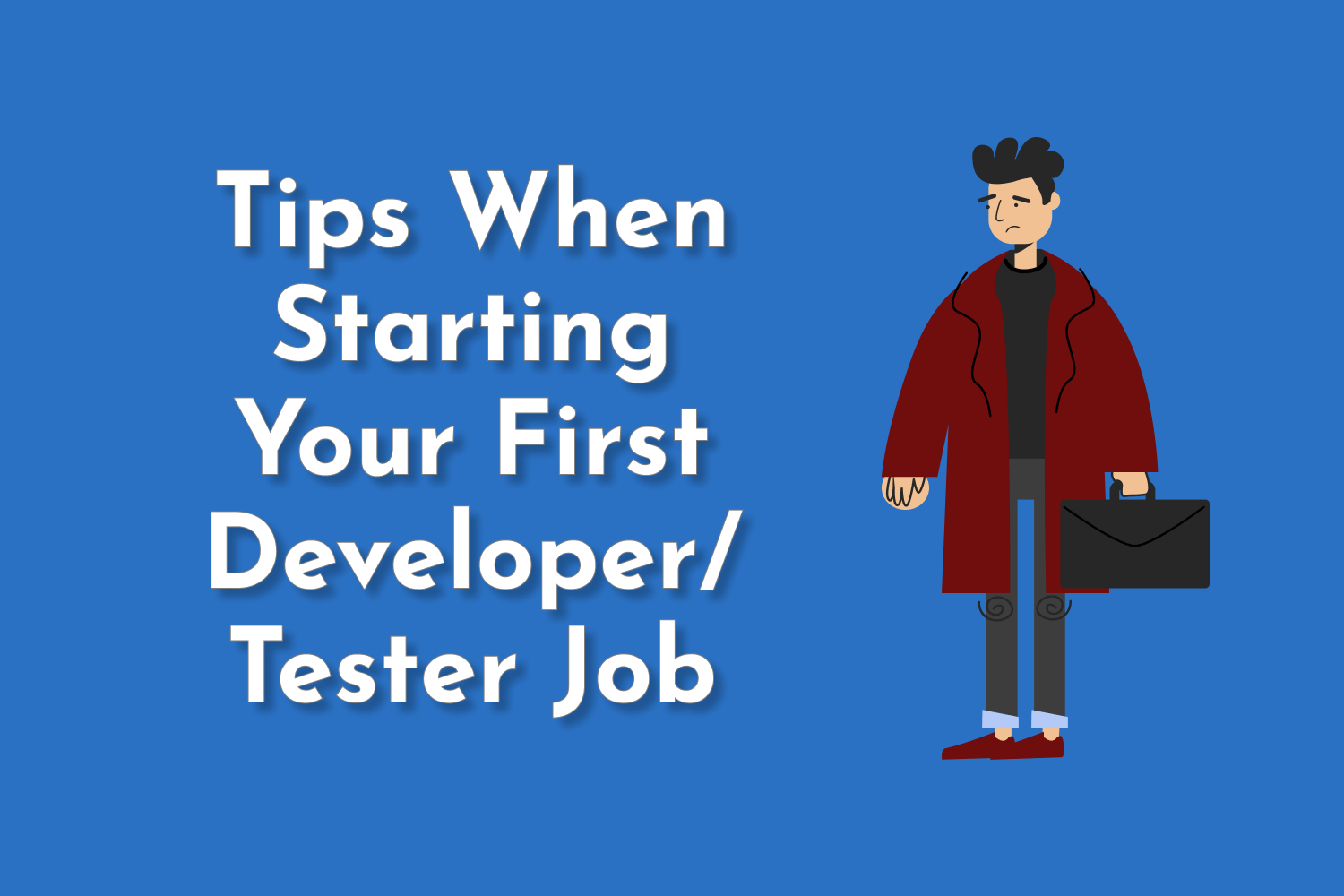It seems like the job market for developers and testers is on the upswing because I've been seeing lots of buzz about people landing their first jobs. If that's you, congratulations! I'm sure it's an exciting time right now, having the chance to work in one of these dynamic fields. With these career types going strong and expected to grow for the foreseeable future, the opportunities to take your career where you want to go are endless.
However, with the excitement of receiving your first job as a developer or tester, I'm guessing that there's also a bit of anxiety and worry. My hunch is because most of the social media posts from those first-time workers have phrases such as "I don't know how I'm gonna handle this" and "Where do I even begin on my first day/week/month?". Don't worry, it's perfectly understandable. It's a new situation, probably in a new field, and you don't want to squander your chances.
It's normal to seek out some advice or "must-know" things before beginning this new journey. It's challenging for experienced developers and testers to offer a "one-size-fits-all" reply since your circumstances are somewhat unique. Every company provides a unique experience depending on various factors. But there are a few pointers that fit with almost all developers and testers that will help you manage those first couple of nerve-wracking weeks on the new job.
Don't sweat the mistakes — they're going to happen anyway
No matter how careful you are and how diligent you do your work, you'll inevitably make an honest mistake while on the job. It might be a small thing on your very first day that's barely noticeable, or it might be a significant problem a few weeks down the line. The point is, accidents happen, and you won't be immune to them. I've had my fair share of blunders throughout my career, even with my years of experience. So expect that fateful day when something goes wrong to come sooner or later.
I mention this not to make people more stressed out over the new job. I mean, when starting any new career, there's always nerves and anxiety creeping in. I bring this up because things won't be as bad as they seem when it happens. My top piece of advice for anyone new to the workplace is not to freak out when you make your first mistake. When that first mistake happens, it'll seem like it's the end of the line for you, and you can kiss your job goodbye. However, that rarely happens with new members of any team.
At most mature organizations, the senior members of the group will know that new employees need time to gain an understanding of their new environment, especially those with their first job ever. They'll almost expect mistakes to occur at some point, so they'll have sufficient preparation to limit the scope of the damage, like restricting access to critical systems or giving you smaller tasks at the start. Your first mistakes will be relatively minor and easily recoverable, so there's no need to worry too much about making an error. It may inconvenience some people at the time, but it probably won't cause significant long-term damage to your company.
On the positive side of things, these first mistakes you commit are excellent learning opportunities when you learn from them. The most significant gains in your professional development will come from getting your hands dirty while learning what works and what doesn't. This growth not only benefits you, but others will learn something new as well. For example, if you accidentally deleted some data you shouldn't have touched, not only will you know how to avoid the mistake, your tech leads will also learn how to prevent it from happening again in the future.
The most crucial piece of learning from your mistakes is to never, ever cover them up. No matter how hard you try to cover your tracks, it'll eventually come out and can cause irreparable damage to your professional career. Once you lose even a tiny bit of trust at the beginning of your job, you'll have to spend an incredible amount of time to recover it, if you ever do. As long as you don't hide your errors, learn something, and recover from them, your mistakes can become stepping stones to the next level of your work life.
No question is foolish or insignificant, so ask away
No matter which field they're in, new entrants to the professional universe are often worried about asking questions related to their job and organization. They think they'll be an annoyance or have no clue about what they're supposed to do with their work. Impostor syndrome is a massive obstacle for everyone, no matter their background, and that pattern feels a hundred times stronger when you're new to the workforce.
Still, one of the worst things you can do for your professional career is to keep questions to yourself. Even if you think your questions are nonsensical, too simple, or unimportant, ask them anyway. Your thoughts and inquiries related to your new job matter, regardless of what that little voice inside your head says. If those questions didn't matter to you, they likely wouldn't be floating around in your mind, waiting to get asked.
In my experience, asking questions is the quickest way to get up to speed with your new job and your career. Asking the right questions shows that you're paying attention and have a keen interest in doing the right thing for everyone involved. Your co-workers will appreciate that and will gladly help you with anything you need to know. Instead of wasting massive amounts of mental energy assuming and wondering, just ask, and you'll save a ton of time and effort that you can use for more important matters.
Even better, your question may be the spark that revolutionizes improves your team and your company. Most organizations have unwritten rules as part of their company culture, or they do something because it's the way they've always done. For instance, I asked about some specific workflows at one company I began working for since they didn't seem very efficient for us. My boss replied "Hmm, I never thought about why we work that way, it's how we've always done it, even before I got here." It eventually led to a change in our process that produced solid productivity boosts for the entire team.
Be careful about asking questions as soon as something blocks you, though. If you become too dependent on others, they'll notice and will become less inclined to help. It's okay to ask lots of questions since you're still learning. But it would be best if you also tried to do some research instead of immediately relying on your team every time something stands in your way. Showing initiative and the ability to work and think independently allows you to bring the best version of yourself and builds vital skills to further your career.
Spot opportunities to do the things others won't do
In every organization across the globe lies a backlog of tasks that have lingered around for weeks, months, or even years. Every company has its fair share of grunt work that gets put to the side for different reasons. Usually, it's because it's low-priority work that eventually needs to get done, but no one wants to be the person responsible. Common backlog tasks are updating documentation, fixing cosmetic bugs in an application, and updating libraries and packages for your current tech stack.
People rarely want to do grunt work, opting instead to focus on the more exciting parts of their job. However, it's work that still needs to get done eventually. Picking up grunt work provides an excellent opportunity to get up to speed with your new job much faster. If you spot a task that's been lying around for a while that you can tackle, consider carving out the time to do it. It's a sure-fire way to gain tons of appreciation and respect from your team, and they'll become more willing to help you improve because you showed initiative.
Some tasks on your organization's backlog are likely low-hanging fruit. For instance, there may be some tasks to update the code repository's documentation. Since you're new to the project, handling this task is ideal because you'll have a unique perspective compared to others who have been part of the company for months or years. You'll avoid blind spots that others have developed and may even find areas to improve in the project that others haven't noticed.
If you're more ambitious, you can find larger areas of improvement that haven't been documented but are clear improvements. An excellent example of this is how I took on the task of building an automated test suite for an application with no tests. Most projects have places that need some attention, but they're not a one-off task for a single person, like improving the deployment process of your project or speeding up the automated test suite. In these instances, you might want to coordinate with the team and spearhead the initiative with others later in your tenure with the company.
The trick to doing this kind of work is to balance it out with high-priority, high-value tasks. While doing this kind of work is beneficial, you also won't want to be "the grunt work person" on your team, where all these minor issues get shoved on your plate and inevitably lead you to burnout. You also don't want to ignore the vital work needed for your business to grow, which keeps the lights on and allows you to keep your job.
Summary - You can do this
Getting that first job in your career as a developer or tester is an exciting experience. However, it can also be a nerve-wracking event for anyone. It's completely understandable — you're jumping into a new environment, full of fresh challenges and many unknowns. However, it doesn't have to be stressful. Most of the reasons causing this anxiety aren't as bad as you think.
If you're worried about making a grave mistake on the job, you shouldn't. Mistakes will inevitably happen, won't be as damaging as you think, and they'll provide excellent learning opportunities that will help you grow. Also, don't be afraid to ask questions to your new co-workers. As long as they can see you're trying to figure things out, they'll gladly help. Finally, if you identify any work tasks or projects that are "less glamorous" but will significantly help your organization, take the time to handle them. Your team will view you as a hero, all while you're expanding your knowledge.
The common thread across this article is that no matter which job you're in, you should do your best to demonstrate that you're a valuable part of the team, someone who's interested in helping others and the organization thrive. When the people around you enjoy and respect your work, it will make your first job much more comfortable to start. It'll also put you on the right path towards a long and successful career.
In short, stop worrying because you have what it takes to succeed. After all, you got hired, so that means you're prepared for whatever's ahead.
What's your main worry when starting a new job? If you have other bits of advice to help others navigate their troubles, share them in the comments below!


